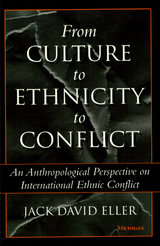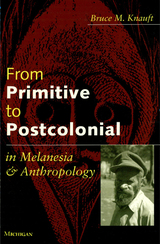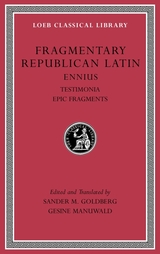
The assimilated assimilator.
Quintus Ennius (239–169 BC), widely regarded as the father of Roman literature, was instrumental in creating a new Roman literary identity and inspired major developments in Roman religion, social organization, and popular culture. Born in the Calabrian town of Rudiae in Magna Graecia, Ennius claimed descent from Messapus, eponymous hero of Messapia, and was uncle to the tragic dramatist Pacuvius. Brought in 204 from Sardinia to Rome in the entourage of Cato, Ennius took up independent residence on the Aventine and, fluent in his native Oscan as well as Greek and Latin, became one of the first teachers to introduce Greek learning to Romans through public readings of Greek and Latin texts. Transcending partisan interests, Ennius cultivated familiar relationships with several of Rome’s most distinguished families, including that of Marcus Fulvius Nobilior, through whose patronage he eventually attained Roman citizenship.
Best known for domesticating Greek epic and drama, Ennius also pursued a wide range of literary endeavors and, with the apparent exception of comedy, found success in all of them. He thus played a major role in setting Latin literature on the assimilationist course that was to be its hallmark throughout the Republican period. His tragedies were long regarded as classics of the genre, and his Annals gave Roman epic its canonical shape and pioneered many of its most characteristic features. Other endeavors included philosophical works in prose and verse, epigrams, didactic poems, dramas on Roman themes (praetextae), and occasional poetry that informed the later development of satire.
This two-volume edition of Ennius, which inaugurates the Loeb series Fragmentary Republican Latin, replaces that of Warmington in Remains of Old Latin, Volume I and offers fresh texts, translations, and annotation that are fully current with modern scholarship.
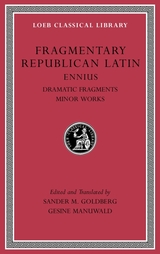
The assimilated assimilator.
Quintus Ennius (239–169 BC), widely regarded as the father of Roman literature, was instrumental in creating a new Roman literary identity and inspired major developments in Roman religion, social organization, and popular culture. Born in the Calabrian town of Rudiae in Magna Graecia, Ennius claimed descent from Messapus, eponymous hero of Messapia, and was uncle to the tragic dramatist Pacuvius. Brought in 204 from Sardinia to Rome in the entourage of Cato, Ennius took up independent residence on the Aventine and, fluent in his native Oscan as well as Greek and Latin, became one of the first teachers to introduce Greek learning to Romans through public readings of Greek and Latin texts. Transcending partisan interests, Ennius cultivated familiar relationships with several of Rome’s most distinguished families, including that of Marcus Fulvius Nobilior, through whose patronage he eventually attained Roman citizenship.
Best known for domesticating Greek epic and drama, Ennius also pursued a wide range of literary endeavors and, with the apparent exception of comedy, found success in all of them. He thus played a major role in setting Latin literature on the assimilationist course that was to be its hallmark throughout the Republican period. His tragedies were long regarded as classics of the genre, and his Annals gave Roman epic its canonical shape and pioneered many of its most characteristic features. Other endeavors included philosophical works in prose and verse, epigrams, didactic poems, dramas on Roman themes (praetextae), and occasional poetry that informed the later development of satire.
This two-volume edition of Ennius, which inaugurates the Loeb series Fragmentary Republican Latin, replaces that of Warmington in Remains of Old Latin, Volume I and offers fresh texts, translations, and annotation that are fully current with modern scholarship.

Rhetorical remnants.
The Loeb Classical Library series Fragmentary Republican Latin continues with oratory, an important element of Roman life from the earliest times, essential to running public affairs and for advancing individual careers long before it acquired literary dimensions, which happened once orators decided to write up and circulate written versions of their speeches after delivery.
Beginning with Appius Claudius Caecus (340–273 BC), this three-volume edition covers the full range of speech-making—political, juridical, and epideictic (display)—and with the exceptions of Cato the Elder and Cicero includes all individuals for whom speech-making is attested and for whose speeches quotations, descriptive testimonia, or historiographic recreations survive.
Such an overview provides insight into the typical forms and themes of Roman oratory as well as its wide variety of occasions and styles. By including orators from different phases within the Republican period as well as men given high or low rankings by contemporaries and later ancient critics, the collection offers a fuller panorama of Roman Republican oratory than a selection guided simply by an orator’s alleged or canonical quality, or by the amount of evidence available.
This edition includes all the orators recognized by Malcovati and follows her numbering, but the texts have been drawn from the most recent and reliable editions of the source authors and revised in light of current scholarship; additional material has been included with its own separate numbering. Helping to guide readers through the material are faithful translations, informative introductions, and ample annotation.

Rhetorical remnants.
The Loeb Classical Library series Fragmentary Republican Latin continues with oratory, an important element of Roman life from the earliest times, essential to running public affairs and for advancing individual careers long before it acquired literary dimensions, which happened once orators decided to write up and circulate written versions of their speeches after delivery.
Beginning with Appius Claudius Caecus (340–273 BC), this three-volume edition covers the full range of speech-making—political, juridical, and epideictic (display)—and with the exceptions of Cato the Elder and Cicero includes all individuals for whom speech-making is attested and for whose speeches quotations, descriptive testimonia, or historiographic recreations survive.
Such an overview provides insight into the typical forms and themes of Roman oratory as well as its wide variety of occasions and styles. By including orators from different phases within the Republican period as well as men given high or low rankings by contemporaries and later ancient critics, the collection offers a fuller panorama of Roman Republican oratory than a selection guided simply by an orator’s alleged or canonical quality, or by the amount of evidence available.
This edition includes all the orators recognized by Malcovati and follows her numbering, but the texts have been drawn from the most recent and reliable editions of the source authors and revised in light of current scholarship; additional material has been included with its own separate numbering. Helping to guide readers through the material are faithful translations, informative introductions, and ample annotation.

Rhetorical remnants.
The Loeb Classical Library series Fragmentary Republican Latin continues with oratory, an important element of Roman life from the earliest times, essential to running public affairs and for advancing individual careers long before it acquired literary dimensions, which happened once orators decided to write up and circulate written versions of their speeches after delivery.
Beginning with Appius Claudius Caecus (340–273 BC), this three-volume edition covers the full range of speech-making—political, juridical, and epideictic (display)—and with the exceptions of Cato the Elder and Cicero includes all individuals for whom speech-making is attested and for whose speeches quotations, descriptive testimonia, or historiographic recreations survive.
Such an overview provides insight into the typical forms and themes of Roman oratory as well as its wide variety of occasions and styles. By including orators from different phases within the Republican period as well as men given high or low rankings by contemporaries and later ancient critics, the collection offers a fuller panorama of Roman Republican oratory than a selection guided simply by an orator’s alleged or canonical quality, or by the amount of evidence available.
This edition includes all the orators recognized by Malcovati and follows her numbering, but the texts have been drawn from the most recent and reliable editions of the source authors and revised in light of current scholarship; additional material has been included with its own separate numbering. Helping to guide readers through the material are faithful translations, informative introductions, and ample annotation.
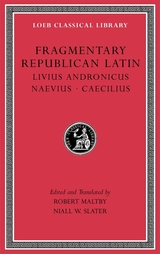
Three foundational Roman poets.
The Loeb Classical Library series Fragmentary Republican Latin continues with three highly influential pioneers in the creation and development of Latin poetry.
Livius Andronicus (born ca. 292 BC) was regarded by the Romans as the founder of Latin literature, introducing tragedy and comedy, adapting Homer’s Odyssey into Saturnian verse, and composing a nationally important hymn for Juno. A meeting place for writers and actors was established in the temple of Minerva on the Aventine in recognition of his poetic achievements.
Naevius (born ca. 280–260), though most famous for his comedies, also wrote tragedy and epic. He innovated by incorporating Roman material into his Greek models and writing on Roman subjects independently. The inventor of the fabula praetexta, drama on a Roman theme, he also introduced new topics to Roman tragedy, especially those relating to Troy, and his Punic War, the first epic on a Roman historical subject, was a longtime school text and a favorite of Augustus.
Caecilius (born probably in the 220s), a friend of the older Ennius, excelled at comedy, of which he was Rome’s leading exponent during his career, and was so considered by posterity. Caecilius continued the Naevian practice of inserting Roman allusions into his works and was admired by later critics particularly for his substantive and well-constructed plots, and for his ability to arouse emotion.
The texts are based on the most recent and reliable editions of the source authors and have been revised, freshly translated, and amply annotated in light of current scholarship.
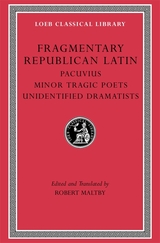
Dilapidated dramas.
The Loeb Classical Library series Fragmentary Republican Latin continues with Marcus Pacuvius (ca. 220–130), deemed by Cicero to be Rome’s greatest tragic poet, together with the fragments of those tragedians of whose work little has survived. Also included are fragments distinguished as dramatic by their meter, but whose genre (tragedy or comedy) can be uncertain.
Pacuvius, a nephew and possibly a pupil of Ennius and an older contemporary of Accius, seems to have had connections with high-ranking politicians and intellectuals, especially those such as Laelius and Scipio who supported Hellenistic culture at Rome; certainly he was remembered as a learned poet, and among his compositions was a fabula praetexta on L. Aemilius Paulus’ victory at Pydna in 168. He tended to treat less obvious aspects of the mythological tradition, perhaps a sign of his own originality, which allowed him to explore in depth issues that seem to have particularly interested him, such as mistaken or false identity ending in final recognition, and noble characters in reduced circumstances. There are also philosophical and cosmological themes, as in plays featuring characters recognized as related who join in overthrowing unjust rulers, raising questions of justice, power, and the role of a good ruler. His works remained in the repertory, were often quoted by orators, and influenced later poets such as Plautus, Terence, Virgil, and Ovid.
The texts are based on the most recent and reliable editions of the source authors and have been revised, freshly translated, and amply annotated in light of current scholarship.
READERS
Browse our collection.
PUBLISHERS
See BiblioVault's publisher services.
STUDENT SERVICES
Files for college accessibility offices.
UChicago Accessibility Resources
home | accessibility | search | about | contact us
BiblioVault ® 2001 - 2025
The University of Chicago Press



